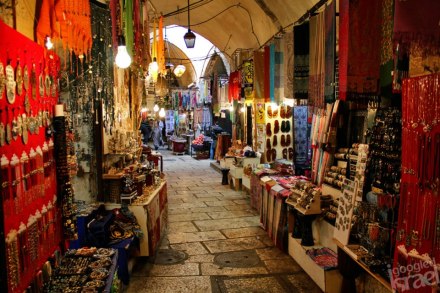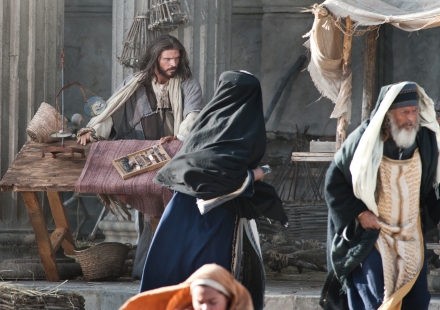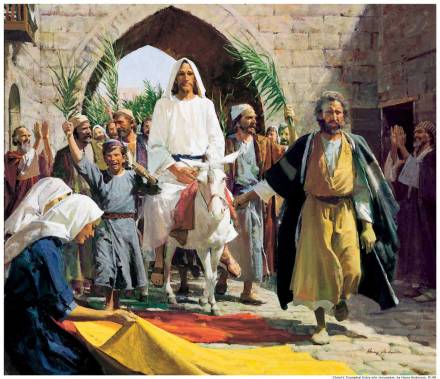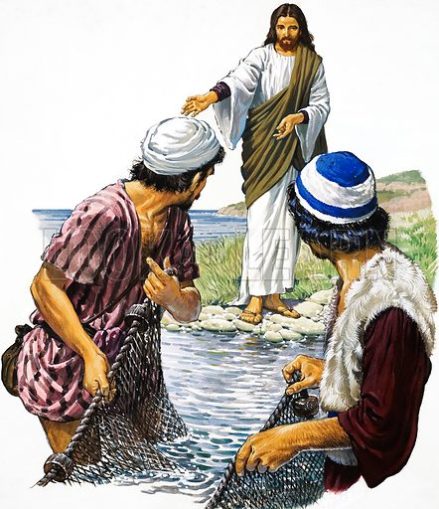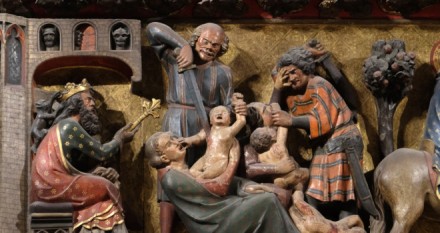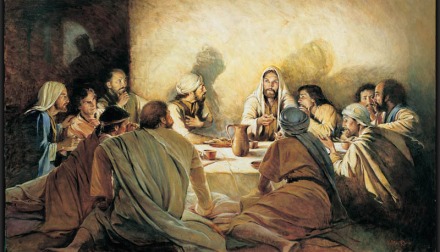
Thursday
On 15th Nissan, Mary and Martha came with Lazarus to celebrate Passover with us. Martha got busy organising the buying of a lamb, big enough to feed all of us, and small enough to make sure it would all be eaten before dawn. Lazarus and Judas took the beast to the Temple and waited in line to see it slaughtered by the Priests. We live in a very special time. For generations we have not had a Temple where we have been able to perform our rituals, and now we do. Truly we are a blessed people.
Mary, Martha and the servant working for the follower who had offered his house for our use, had the job of making enough unleavened bread for our Passover meal. The making of the unleavened bread is a skilled job, at least that is what mother always used to say. You have to mix flour and water together and cook it as soon as it is properly mixed. You can’t let it rise at all. If bubbles start to appear as it is cooking, then you have to quickly prick it all over with the tip of a knife. In the story of the Exodus from Egypt we had to eat unleavened bread as we knew we were going to be leaving in a hurry and didn’t have time for the bread to rise. So we eat it now in remembrance of that night. It also has the advantage of being a very light bread, and as it is flat, easy to pack in your bag. We have often eaten it as we have travelled around. It lasts for days, but it does lack taste. In Jerusalem where there is little fuel, men and women from the local villages spend weeks before the festival making matzos for those who come without their own supplies. Still, at the end of the cooking marathon, Martha bought in more to supplement what had already been made, which she didn’t think would be enough for all of us, for the whole seven days of the festival.
The Seder meal took place in the large room of the house where we were all staying. When we began to gather from our errands around the city, Jesus was already there waiting for us. He had a cloth over his arm, and a bowl of water ready. He motioned to Peter to sit, so that he could wash his feet. Peter refused outright, saying that it was the job of a servant to wash our feet as a welcome, as we entered the house. Jesus told him that he was making the point, yet again, that the Kingdom of Yahweh was not like earthly kingdoms. In Yahweh’s kingdom it is those who are the least, that are the most respected, and we could not expect to take our places in the kingdom if we did not learn that lesson. At that Peter, as usual, went over the top and told Jesus that he should wash not only his feet, but his face and hands as well. Jesus laughed and clapped him on the back, and told him that washing just his feet would be fine. It was odd having my feet washed by Jesus. He took them into his hands so carefully and gently. He washed them making sure that all the dirt and dust of the road was removed and that they were completely clean. His touch and his care moved me beyond anything else he has done or said. It is good to be a servant in the Kingdom of Yahweh.
I think the Seder meal itself is like a dance, we take story and food, prayer and wine and we weave them together. We share and we join, we laugh and we cry, and sometimes we dance as well. We enter into the meal wholeheartedly, completely, fully. The Seder meal is something we have shared all our lives, so no matter who we are we all know the parts we have to play. After the first blessing and the first cup of wine, John as the youngest that night asked the four questions a child present would ask. ‘Why is tonight different from all other nights? Why do we…’ And Jesus wove the narrative of the Haggadah to tell the story of our escape from Egypt. I looked properly for the first time at the Matza, the unleavened bread as one was broken and the small piece put back on the pile, and the large piece put safely away to be eaten later. We heard again of the urgency of the situation; that we had no time. John then asked why we ate no vegetables, only the bitter herbs, such as romaine lettuce or endive. It is eaten dipped in a sauce which is supposed to represent the mortar with which the Israelites bound the bricks together as they built for the Egyptians. It certainly looks like mortar, and some samples I have seen could be used to build houses. It tastes no better either. We also dipped parsley in the salt water and ate it, and were reminded of the tears of the slaves kept in captivity in a strange land. Not one dipping, but two, something we would never usually do, and so the child has to ask why? Then the final part of the story. Why is the meat exclusively roasted? The story here dips into the strange way in which we left Egypt; that Yahweh sent a great sickness over the land, and all of the firstborn were killed, from the son of Pharaoh, to the last sheep in the field. Only those who had smeared the blood of their sacrificial lambs on the posts of their doors, were saved. The passover lamb had to be roasted and eaten, and nothing was to be left over. The people had to eat with their cloaks and staffs at the ready, with all their belongings packed and ready to leave when the call came. With dawn and the discovery of death, with the confusion of the Egyptians, the Israelites slipped away to begin their long adventurous journey home.
Our Seder that night was like all other Seders across the land, in any places where Israelites meet together, until Jesus took again the afikoman, the large part of the broken Matza that he had put to one side. This night he blessed it and broke it into the olive size pieces required. His blessing was personal;
‘This is my body broken for you. Whenever you meet together break bread and remember me.’
The room fell silent as we all took in the words which Jesus had just said. Peter opened his mouth to say something, but Jesus silenced him with a look, put his piece of the afikoman into his hands and moved around the table giving us all our piece.
‘Now eat’, he said. And we all did.
He picked up the third cup of wine of the meal and blessed it and gave it to each of us in turn
‘This is my blood of the new covenant between me and you, between Yahweh and his people. When you meet together take wine and bless it and share it as you remember me.’
Then he picked up the fourth and final cup and began the words of the Hallel beginning with psalm 113
“Praise the Lord. Praise the Lord, you his servants; praise the name of the Lord. Let the name of the Lord be praised, both now and for evermore. From the rising of the sun to the place where it sets, the name of the Lord is to be praised. The Lord is exalted over all the nations, his glory above the heavens. Who is like the Lord our God, the One who sits enthroned on high, who stoops down to look on the heavens and the earth? He raises the poor from the dust and lifts the needy from the ash heap; he seats them with princes, with the princes of his people. He settles the childless woman in her home as a happy mother of children. Praise the Lord.”
Then we moved on the Psalm 114. When we reached to traditional end of Psalm 118 Jesus stood and stretched.
‘I would like to go and pray now. Who will come with me? There was a lot of groaning around the room as it was late. We had been busy all day, and eaten and drunk well, but we reluctantly gathered our cloaks and headed towards the door. As we were letting ourselves out of the door someone suddenly asked ‘Where is Judas, he was here not so long ago?’ Everyone turned to look at Jesus. ‘He has gone to do what he must do. Let us go.’
And at that moment he looked unbearably tired and sad.

